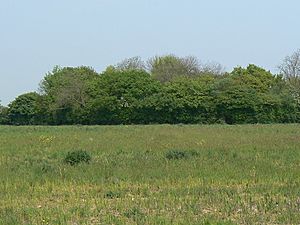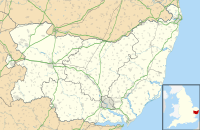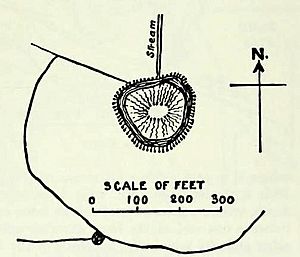Great Ashfield Castle facts for kids
Quick facts for kids Great Ashfield Castle |
|
|---|---|
| Great Ashfield, Suffolk, England | |

Overgrown remains of Great Ashfield Castle
|
|
| Coordinates | 52°16′11″N 0°55′01″E / 52.2696°N 0.9169°E |
| Type | Motte and bailey |
| Site information | |
| Condition | Earthworks remain |
Great Ashfield Castle, also known locally as Castle Hill, is a medieval motte and bailey castle near the village of Great Ashfield, Suffolk, England. It was built a long time ago, during the Middle Ages. This type of castle was very common after the Normans came to England.
What is Great Ashfield Castle?
Great Ashfield Castle is a Norman motte and bailey castle. It is located near the village of Great Ashfield in Suffolk. A motte and bailey castle has two main parts. The "motte" is a large, tall mound of earth. On top of this mound, a wooden or stone tower would have stood.
The motte at Great Ashfield Castle is quite big. It measures about 130 feet across at its base. It also stands about 24 feet high. This would have given defenders a good view of the surrounding area.
The Castle's Defenses
Around the motte, there was a fosse. A fosse is a wide ditch, like a moat. This ditch was about 18 feet wide and 7 feet deep. It made it harder for enemies to reach the castle. Some studies suggest this ditch might have been added later. This means the castle's defenses were improved over time.
The "bailey" part of the castle was a courtyard. This area was usually surrounded by a fence or wall. It would have held buildings like stables, kitchens, and homes. People living in the castle would have worked and lived here.
Great Ashfield Castle Today
Today, Great Ashfield Castle is not a complete building. Only the earthworks remain. This means you can still see the big mound and the ditch. These features show where the castle once stood. It helps us imagine what it looked like centuries ago.
The castle is now a scheduled monument. This means it is a very important historical site. The government protects it so it cannot be damaged. This helps make sure future generations can learn about its history.
 | James Van Der Zee |
 | Alma Thomas |
 | Ellis Wilson |
 | Margaret Taylor-Burroughs |



